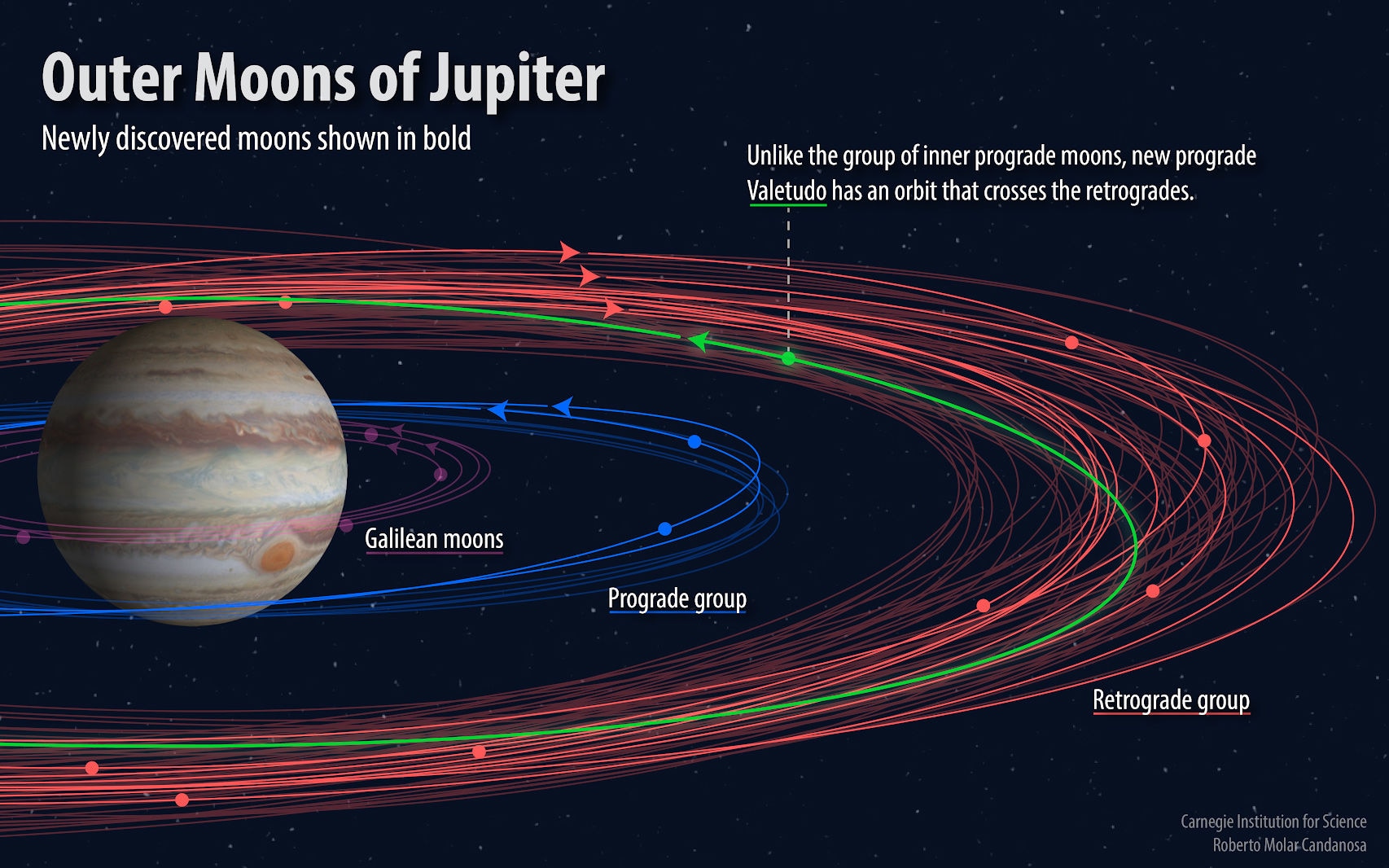Create a free profile to get unlimited access to exclusive videos, sweepstakes, and more!
Contest: Pick names for Jupiter's new moons!

If there's one thing you can say about Jupiter, it's that it has a lot of moons.
I can actually say a lot of things about Jupiter, but in fact it does have a lot of moons. Last year, astronomer Scott Sheppard and his team announced that they had found an even dozen new moons, in fact, bringing the total known Jovian satellites to 79.
Which brings up an interesting question. What do we name them?
Once confirmed, the satellites are given a designation. The nomenclature for that is S/XXXX JY, where S is for satellite, XXXX is the year it was found, J is for Jupiter, and Y is the number of the moon in the order it was found for that year. So, for example, some of these new moons are called S/2016 J1, S/2016 J2, S/2018 J1, and so on.
But that's unsatisfactory, not to mention awkward. We already have wonderful names for some of Jupiter's moons, like Io, Europa, Ganymede, Callisto (the four Galilean moons), Amalthea, Metis, Adrastea, Themisto, Carpo (also the little-known sixth Marx brother), Himalia, Leda… well, you get the picture. There are dozens more.
Now that these newly discovered moons have been confirmed it's time to name them. In general, the discoverer can suggest names to the International Astronomical Union (or IAU), the keeper of rules and lists of names. They'll mull things over and decide if the names are up to snuff.
Faced with this, Sheppard and his team have decided to do something fun: Hold a contest where you, Earthling, can suggest names for these tiny worlds*!
All you have to do is submit your suggestions to the team by simply tweeting them to the handle @JupiterLunacy (ha!) on Twitter, either as a text tweet or as a short video, and adding the hashtag #NameJupitersMoons. Cool!
Oh wait. It's not that simple. There are some rules. These actually come from the IAU, so pay attention, because if you don't follow the rules the names won't be accepted:
- Jupiter's moons must be named after Roman or Greek mythological characters who were either descendants or lovers of the god known as Jupiter (Roman) or Zeus (Greeks).
- Submissions must be 16 characters of fewer, and preferably one word.
- Submissions must not be offensive in any language or to any culture (the onus is on you to ensure this)
- Submissions must not be too similar to the existing names of any moons or asteroids (you can check that here).
- Names of a purely or principally commercial nature are prohibited.
- Names of individuals, places, or events that are principally known for political, military, or religious activities are not suitable.
- Names commemorating living persons are not allowed.
Those are pretty clear. But wait! There's more! Well, two more.
If the moon orbits Jupiter prograde — in the same direction as Jupiter's spin — the name must end with an "a". If it orbits retrograde — opposite Jupiter's spin — the name has to end with an "e". Again, these are IAU rules; usually set up for historical reasons and then maintained for consistency today (for example, the first four asteroids discovered were named after women, so it became a tradition to keep naming them for women… until it became clear that there are way too many asteroids out there and they're too easily discovered to continue that tradition. Now they try to name them after notable people who have contributed to science in some way, though in some cases that's suspect).
It turns out Jupiter and Zeus were, ah, popular with the mortals back in the day, so there are tons of names to choose from. This video by Lunartic was made last year after the new moons were discovered, and will give you a taste of what's what:
So, ready to go? OK, one more thing…
Sometimes, an object like a moon is discovered, and all the good names affiliated with that particular god are taken. When the New Horizons team used Hubble to look more deeply at Pluto before the 2015 spacecraft encounter, for example, they discovered some new moons. They wanted to name two of them Cerberus and Nyx (the three-headed dog that guards the underworld, and the goddess of darkness), but both of those names were already used for asteroids! So they used alternative spelling: Kerberos (the Greek spelling) and Nix (Egyptian).
That makes me think we could do the same thing. Why not stretch the rules a bit? And if so, why not really do it?
It occurs to me that the word "Jupiter" can be interpreted in many ways. As, say, the name of the spaceship in Lost in Space. Sure, it's the Jupiter 2, but I think it still counts, especially since I loved that show as a kid.
One problem: None of the character names ends in a or e! John Robinson, Maureen Robinson, Don West, Zachary Smith, Judy, Penny, Will… Nuts.
… but wait a sec. Penny is a nickname. It's short for Penelope! That works! And I'm willing to accept that she is a daughter of the Jupiter 2, at least metaphorically.
…except it's already an asteroid name. Nuts.
But maybe we can play with the spelling. Pennelope. Pehnellohpee.
Sigh. OK, never mind. I can admit they'd never accept this anyway.
Do you think you can do better? Then get submitting! The contest ends on April 15, 2019, so get moving!
*One of the new moons has already already a name suggested by the astronomers: Valetudo, the Roman name for Hygieia, the Greek goddess of health.


























